How to Protect Yourself From Scammers Offering Fake Jobs
A growing trend of scammers impersonating recruiters is making it even harder to find a job.

Scammers post fake jobs, but others reach out directly to job seekers through direct messages or texts. If the scammers are looking to steal your personal information, they may ask you to fill out several forms that include information like your Social Security number and driver’s license details. Broadcast Retirement Network's Jeffrey Snyder discusses how to protect yourself from these scammers with Eva Velasquez, Identity Theft Resource Center.
JEFFREY SNYDER, BROADCAST RETIREMENT NETWORK
(0:04) This morning on BRN Privacy, how to protect yourself from scammers offering fake jobs. (0:12) Joining me now to discuss this is Eva Velasquez of the Identity Theft Resource Center. (0:19) Eva, so great to see you.
(0:20) Thanks for joining us on the program this morning.
EVA VELASQUEZ, IDENTITY THEFT RESOURCE CENTER
(0:23) Happy to be here. (0:24) Hope we can educate some folks.
JEFFREY SNYDER, BROADCAST RETIREMENT NETWORK
(0:26) Yeah, this is a big, let's just back up for a second. (0:29) How big of an issue are scammers and more importantly, things like fake jobs? (0:39) I'd never heard of this until reading this article.
(0:42) Is this kind of a newer trend where people now, scammers are offering fake jobs to people?
EVA VELASQUEZ, IDENTITY THEFT RESOURCE CENTER
(0:48) Well, scams in general have become absolutely explosive. (0:54) The losses globally are in the trillion, over a trillion dollars. (0:59) When we look at job scams, those have been around for as long as scams have been around.
(1:05) But we're concerned because we're seeing a rapid increase in that particular scam type in our contact center. (1:13) And so that's why we put out this information. (1:16) When we look at our trends and what are people experiencing, we saw this incredible growth in job scams and knew we needed to warn the public.
JEFFREY SNYDER, BROADCAST RETIREMENT NETWORK
(1:25) Yeah, so what does it look like? (1:28) And we'll probably have some graphics and footage as we go. (1:31) But what does this typically look like?
(1:33) Is it in the form of an email, a text, a social media post or all the above?
EVA VELASQUEZ, IDENTITY THEFT RESOURCE CENTER
(1:39) Yeah, the short answer is yes. (1:42) It looks like all of those things. (1:44) And there are typically two pathways that people engage or interact with the criminals.
(1:50) And that is either through a fake posting on a legitimate site. (1:55) So think Indeed or LinkedIn, or through an unsolicited communication, incoming communication from a recruiter. (2:04) And that can come in the form of an email, a text message, a phone call, social media, direct message.
(2:11) It's really across all channels and platforms. (2:15) But those are the two key ways. (2:17) A fake job posting on a legitimate site or incoming communication that's coming directly to you from a phony recruiter.
JEFFREY SNYDER, BROADCAST RETIREMENT NETWORK
(2:25) And how do these scams work? (2:27) Do they ask you to fill out and provide your resume and fill out financial information?
EVA VELASQUEZ, IDENTITY THEFT RESOURCE CENTER
(2:35) Often what we're seeing is that they go above and beyond what a legitimate recruiter or posting would ask for in the initial assessment. (2:43) When you're just applying for a job, you only need to provide your name, your contact information, and your skill set. (2:51) So a resume or a CV, that's it.
(2:54) But a lot of these fake applications start asking for more and more data about you. (3:00) Your date of birth, your driver's license number, your passport number, sometimes even copies of those documents or other credentials. (3:09) Sometimes they'll even ask for your banking information.
(3:11) Well, we need your bank account so we know where to put direct deposit for your paycheck. (3:18) But this is before you have even received a job offer. (3:21) So we encourage people to remember that when you're applying for a job, you only need to provide that very basic amount of information.
(3:31) And it's really more about your skill set. (3:33) It's not about your PII or your personally identifiable information.
JEFFREY SNYDER, BROADCAST RETIREMENT NETWORK
(3:38) So it sounds like these platforms, and I have to imagine just like some of the social media platforms, that they're trying to get rid of these types of scams. (3:48) But candidly, it's like whack-a-mole, they just continue to pop up. (3:51) And therefore, it's up to us as consumers to do our research.
EVA VELASQUEZ, IDENTITY THEFT RESOURCE CENTER
(3:57) That's a really good analogy because it is like whack-a-mole. (4:00) Of course, these are legitimate sites. (4:04) And they do have processes and procedures in place to weed out the fraudulent postings and the fraudulent activity.
(4:12) But it's so prevalent that they can't get to all of it. (4:15) So this is a shared responsibility. (4:17) Absolutely, the platforms and the channels that are responsible for putting us in touch with the criminals and the bad actors, they have a responsibility.
(4:27) But we have to do our own homework as well. (4:31) And I can give you some tips on what that looks like.
JEFFREY SNYDER, BROADCAST RETIREMENT NETWORK
(4:33) I was going to follow up and ask you, so what type of homework should we be doing? (4:38) What should we be looking at when we see these ads?
EVA VELASQUEZ, IDENTITY THEFT RESOURCE CENTER
(4:43) Now, it's going to be different depending on if you are seeking out the job or if it comes to you. (4:48) So I'll start with, if you're looking at job postings on the various online sites, I want you to verify that that's legitimate. (4:57) If it's a company, a well-known company or brand, please go directly to that company's website.
(5:04) Check and see, are they hiring? (5:06) Who is the hiring recruiter? (5:08) If possible, go ahead and apply for that job directly through the company's website or whatever process they want you to use.
(5:18) I do have to warn you that some of these scams are so sophisticated that the scammers will do their research and they'll use the name of a legitimate company. (5:30) They will use the name of the legitimate hiring manager and they'll build a fake profile for that person. (5:36) So it can be really, really challenging.
(5:39) But if you do enough of these little things to indicate, you know, do your homework, you can see the red flags, especially if even if there's a legitimate posting and you see it on the website, but the salary is different. (5:54) And often they will be offering a significant increased wage for the type of work that's required. (6:04) So it looks very appealing.
(6:06) You go, wow, that's so much more than other jobs in my industry. (6:11) So high dollar, high wages with sometimes relatively low skillset required and often 100% remote work because they know how appealing that is to people. (6:22) Yeah.
JEFFREY SNYDER, BROADCAST RETIREMENT NETWORK
(6:23) I guess the old adage is true. (6:24) If it's too good to be true, it usually is. (6:30) Are there certain segments?
(6:31) I know we're talking about job applicants. (6:32) There's a second piece to that. (6:34) Okay.
(6:34) Sorry. (6:34) Go ahead. (6:35) Sure.
EVA VELASQUEZ, IDENTITY THEFT RESOURCE CENTER
(6:35) Sorry. (6:36) No, that's okay. (6:37) I just want to make sure I cover it.
(6:39) Now for folks who are getting that text message or that email from a recruiter, this is where you really need to do your homework. (6:46) And I always encourage people to verify that that person is legitimately a recruiter, what company they work for, and try to get in touch with them through a different channel than the original communication was received. (7:02) An example of that would be if you receive a text message from someone saying, hey, I'm Joe Smith.
(7:08) I'm a recruiter with XYZ company and we have this job. (7:11) I want you to try to get in touch with Joe Smith, maybe through a phone number or an email that's listed on the legitimate recruiter's website. (7:21) Now that's not a 100% guarantee.
(7:22) Again, they can be very sophisticated and set up things like fake profiles, but it will weed out some of the less sophisticated bad actors.
JEFFREY SNYDER, BROADCAST RETIREMENT NETWORK
(7:33) Yeah. (7:34) I apologize for interrupting you. (7:35) I was going to ask, are there more vulnerable populations that are susceptible to this?
(7:40) Because you could be of any age looking for a job. (7:44) You could be a younger person just out of college, or you could be someone who's more mature, like myself, who may be making a career change or doing something different. (7:52) So you could be on a deed.
(7:54) So are certain parts of our population more vulnerable than others?
EVA VELASQUEZ, IDENTITY THEFT RESOURCE CENTER
(7:59) There are people that are going to be at an increased risk, but it's not necessarily based on your typical demographics like age. (8:07) It's really about how familiar you are with the workforce and the way that we currently recruit and hire people. (8:15) And that's changed.
(8:16) That's changed dramatically just in the last couple of years. (8:19) So if you're a college student or even a high school student applying for your first job, you may feel like, hey, we're doing this interview over text or on WhatsApp. (8:30) And that feels completely legitimate because that's how you communicate.
(8:36) Now, there are some legitimate organizations that will communicate over text or even over WhatsApp, but an interview is not going to be conducted completely over text. (8:49) I have not seen that happen legitimately or heard that happen legitimately. (8:55) But again, it's not about your age.
(8:57) Maybe you're a recent immigrant to this country and you just don't understand how this system and these processes work. (9:03) Maybe you're someone that took a break from the workforce to raise kids or care for aging parents, and now you're going back into the workforce after an absence. (9:12) So it really is about people who just aren't familiar with how we are currently doing things.
(9:20) And again, frankly, they've changed dramatically just in the last four years.
JEFFREY SNYDER, BROADCAST RETIREMENT NETWORK
(9:24) Yeah, and continue. (9:25) Artificial intelligence really layers up or levels up the interaction. (9:33) Last question for you, and we'll bring it back because I think this is a very important topic.
(9:38) It's one that needs continuous conversation to keep people informed. (9:43) But what do you do if you find a scam? (9:45) What should you do?
(9:46) Should you call the police? (9:47) Should you forward it on to another governmental entity?
EVA VELASQUEZ, IDENTITY THEFT RESOURCE CENTER
(9:51) No, it really depends on what you've discovered and what you have self-compromised. (9:57) We really do encourage people to go ahead and report the scam, even if they discovered it in time to not share their information, because that helps us get a handle on these issues. (10:09) And you can report it to the Federal Trade Commission at identitytheft.gov. You can report it to the FBI at ic3.gov. Now, that is not necessarily going to result in investigation or prosecution, and I really want to make sure people understand that. (10:26) It's very hard to investigate these cases. (10:28) We often don't even know who's at the other end of that communication. (10:32) But reporting it actually does help.
(10:34) It helps law enforcement and advocates such as the ITRC to get a better handle on the scope of the problem. (10:41) Now, if you are a victim and you've shared your information, I always encourage people to get help from a trusted resource and to get a recovery plan. (10:51) Of course, that's where the Identity Theft Resource Center comes in.
(10:55) We're a 501c3 nonprofit organization. (10:58) We're charity. (10:59) Everything we do for the public is at no cost to them.
(11:02) So people can call us on our toll-free number. (11:04) They can live chat with us on our website. (11:06) And they can let us know very specifically what information was compromised.
(11:13) Was it documents? (11:15) Did you send copies of documents? (11:17) What documents?
(11:18) Was it just the numbers? (11:20) Was it your date of birth and your Social Security number? (11:23) Was it your banking information?
(11:25) It's critically important that you make a list of what was that data, because that is how you determine what your recovery plan is going to be. (11:36) Unfortunately, there's not a one-size-fits-all. (11:39) If you're a victim of a scam, do these three things, because scams are so broad and so different, and there's so many ways that we can be victimized and harmed that understanding if it's my Social Security number, I do these things.
(11:53) If it's my financial information, I have to do these things. (11:56) Getting that free plan, I think, is going to be critically important. (12:01) And if you don't come to us, there's the Federal Trade Commission has free resources for victims.
(12:07) AARP has free resources for seniors who are victims. (12:11) So there are a number of free resources available to help people, as long as they don't let shame and embarrassment stand in the way, which is another critical piece. (12:26) The criminals are out there.
(12:29) You are being deluged. (12:31) It's OK. (12:32) A mistake was made.
(12:33) You believed a lie. (12:34) That's no reason to try to do this on your own and not get the help that you need. (12:39) So we're really trying to fight against the shame and embarrassment that victims feel.
JEFFREY SNYDER, BROADCAST RETIREMENT NETWORK
(12:44) That's right. (12:45) Fool me once, shame on you. (12:46) Fool me twice, shame on me.
(12:49) Either way, we're going to have to leave it there. (12:50) Great conversation. (12:51) Very important information.
(12:53) And folks got to pay attention, no matter your age or any factor. (13:01) We're going to have to leave it there. (13:01) Great to talk to you.
(13:02) Thanks for joining us. (13:03) We look forward to having you back on the program again very soon.
EVA VELASQUEZ, IDENTITY THEFT RESOURCE CENTER
(13:06) It was a pleasure.
JEFFREY SNYDER, BROADCAST RETIREMENT NETWORK
(13:07) Thank you. (13:08) And don't forget to subscribe to our daily newsletter, The Morning Pulse, for all the news in one place. (13:12) Details, of course, are at our website.
(13:15) And we're back again tomorrow for another edition of BRN. (13:18) Until then, I'm Jeff Snyder. (13:19) Stay safe.
(13:20) Keep on saving. (13:21) And don't forget, roll with the changes.
What's Your Reaction?




















































